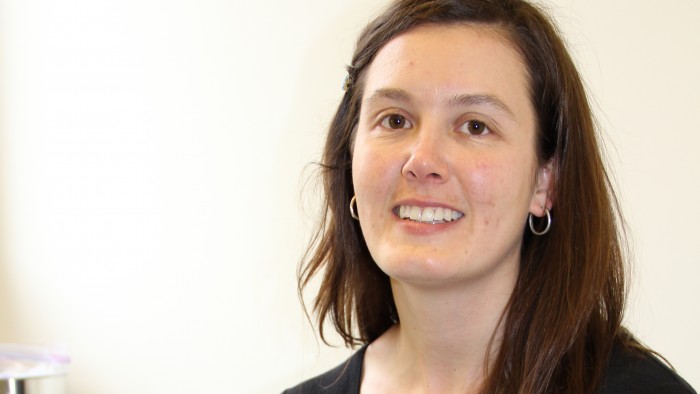Does Obesity Begin in the Womb?

There’s a lot of debate about why people are becoming more obese.
More than one-third of U.S. adults are obese and about 17 percent of U.S. children are, too—not just overweight, but obese (overweight means having more fat than is ideal for health; obese means you might already be shortening your life). If Americans stay on the current path, more than 80 percent of men and 70 percent of women will be overweight or obese by 2020.
Carrie McCurdy, pictured, a new assistant professor in human physiology, has been studying diet and obesity for more than ten years. While obesity in and of itself isn’t necessarily bad, it triggers or precedes diabetes, cardiovascular disease, hypertension and some cancers.
Working at the cellular level, McCurdy examines how fat and sugar are broken down, and the influence of obesity on this process. Her research combines a “whole-body” analysis of subjects with cutting-edge molecular techniques that are increasingly used by today’s scientists.
Q One of your interests is obesity during pregnancy. What are you studying?
A That gestational nine-month window is increasingly recognized as a critical window where the baby’s metabolism is being set. We’re trying to understand how the mother’s diet, coupled with being overweight or obese, affects the fetus. We know that children who are born to women who are overweight or obese have an increased and earlier risk of obesity and diabetes [a condition of high blood sugar that can lead to heart disease or kidney failure]. What we don’t know is whether it’s the obesity during pregnancy that causes this, or what the mother is eating or some combination.
Pregnancy is a great topic for study because women are really motivated to make things better for their child. If you say a healthy diet during pregnancy will improve your child’s health future—and you show them the data that supports it—if it’s within their power, they’re going to change their diet.
Q What have you found?
A Working with other scientists and the Oregon National Primate Research Center, we feed Japanese macaques a typical American diet, higher in fat and sugar. They also get lots of snacks—peanut butter and gummy treats, things that are high in fructose. Junk foods.
What we’re finding is that one-year-old babies exposed to this Western-style diet, in utero, show signs of diseases that you typically wouldn’t see: fat in the liver, fatty streaks in their arteries and damage in muscles. These are babies! Something about the prenatal exposure to a high-fat, high-sugar diet sets them up to have these health risks. Every tissue, every organ system we’ve looked at, is affected by this diet or obesity.
The good news is the situation can be improved. We’ve put obese moms on a healthy diet at the start of pregnancy and we see health improvements for the offspring—fat in the liver is reduced.
Q What are the other risks to offspring?
A Exposure to a Western-style diet in utero also affected behavior. Elinor Sullivan [of Oregon Health and Science University and the University of Portland] found that female offspring displayed increased anxiety and stress; the males trended towards greater aggression. Even when they’re grouped all together and eating a healthy diet, offspring from mothers that ate the Western-style diet spend a greater amount of time by themselves.
Initial data even shows that offspring from these mothers have different food preferences—they tend to choose high-fat, high-sugar food. If they had that in-utero exposure, there’s something that’s been changed in their brain’s wiring that leads them to make bad food choices; these are otherwise healthy monkeys, self-selecting unhealthy behaviors. To me, that’s really scary.
Q Were the problems associated only with offspring from obese mothers?
A No. Some of the mothers in the study were lean but were fed a Western-style diet; their offspring also had fat in the liver, muscle damage and greater risk for disease.
Q So clearly, expectant mothers need to get off high-fat, high-sugar diets?
A That’s what common sense says, but we haven’t proven it scientifically yet. We don’t know if it’s specifically the fat in the diet, or the sugar, or the calories or some combination. We also don’t know if it’s true for humans.
Think about the baby’s environment after birth. There are lots of complicating factors for human research on obesity. For instance, childhood obesity often develops in a home where children are susceptible to eating a poor diet; if the parent is overweight or obese and eating a poor diet, that’s probably what the child eats. You can’t say whether the obesity risk is due to what they ate after they were born, or what they were exposed to in utero or a combination.
I think it’s synergistic. If you have this prenatal exposure and that’s carried forward as you grow up, I think your risk for obesity is greater. You might have one strike against you, but there’s also the likelihood that you’re not going to get obese if you eat healthy food and exercise.
Q Given all the possible causes for obesity, what do you target?
A I focus on “insulin sensitivity”—that is, how well does your body use insulin? Your pancreas makes insulin, which regulates sugar and fat in the blood. The more sensitive to insulin you are, the easier it is to maintain a healthy weight.
In 2001, a study was published about 200 people who had been followed for up to ten years. The people least sensitive to insulin had the most cases of hypertension, cancer, coronary heart disease, diabetes and stroke; those most sensitive to insulin had no such cases. This was regardless of weight—insulin sensitivity alone predicted health outcomes. I think insulin sensitivity is the key to everything.
Q Most people have probably never heard of “insulin sensitivity.” What should we know?
A Insulin sensitivity is basically your risk of becoming diabetic. When you get your annual checkup and the doctor gives you your blood screen, it will break out the insulin and sugar levels in your blood—those describe your risk for developing diabetes. If you’re at risk, your doctor will talk to you.
Q So what’s the message for expectant mothers?
A I don’t think the message is simple. We can certainly say for all people, “Eat healthy.” For expectant mothers, we can’t yet say, “Eliminate this or that,” but some of those messages we’ve all heard over the years—“You can eat for two” [meaning “a lot”] and “You should carry a lot of additional weight”—we can clearly say those messages are bad.
You know the saying, “You are what you eat”?—well, we are finding that you may be what your mother ate. You’ve got a growing baby inside you, why wouldn’t you give it the best building blocks or the best diet?
— Matt Cooper
Photo by Matt Cooper


 Twitter
Twitter Facebook
Facebook Forward
Forward